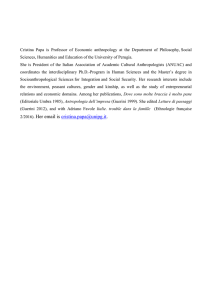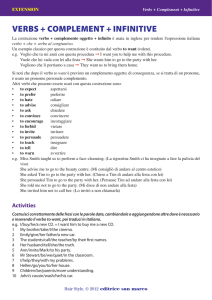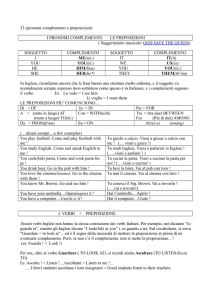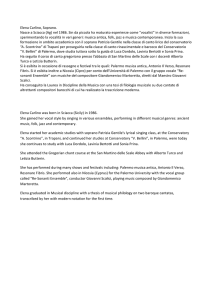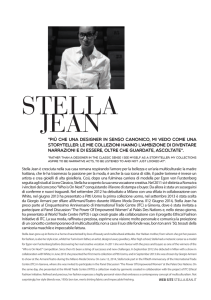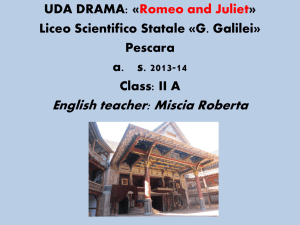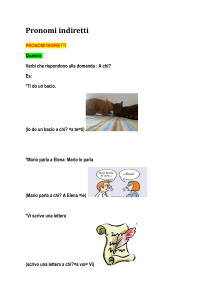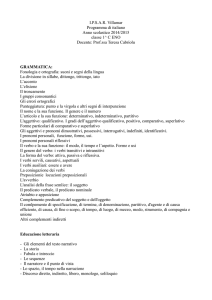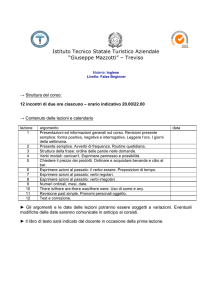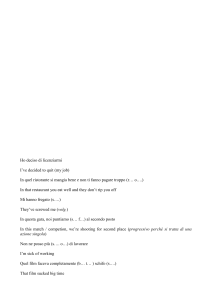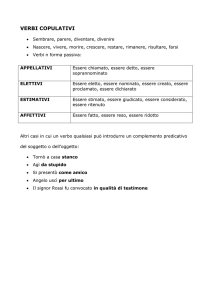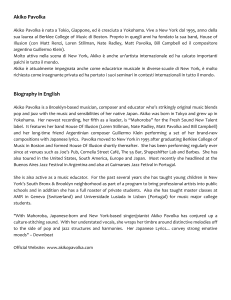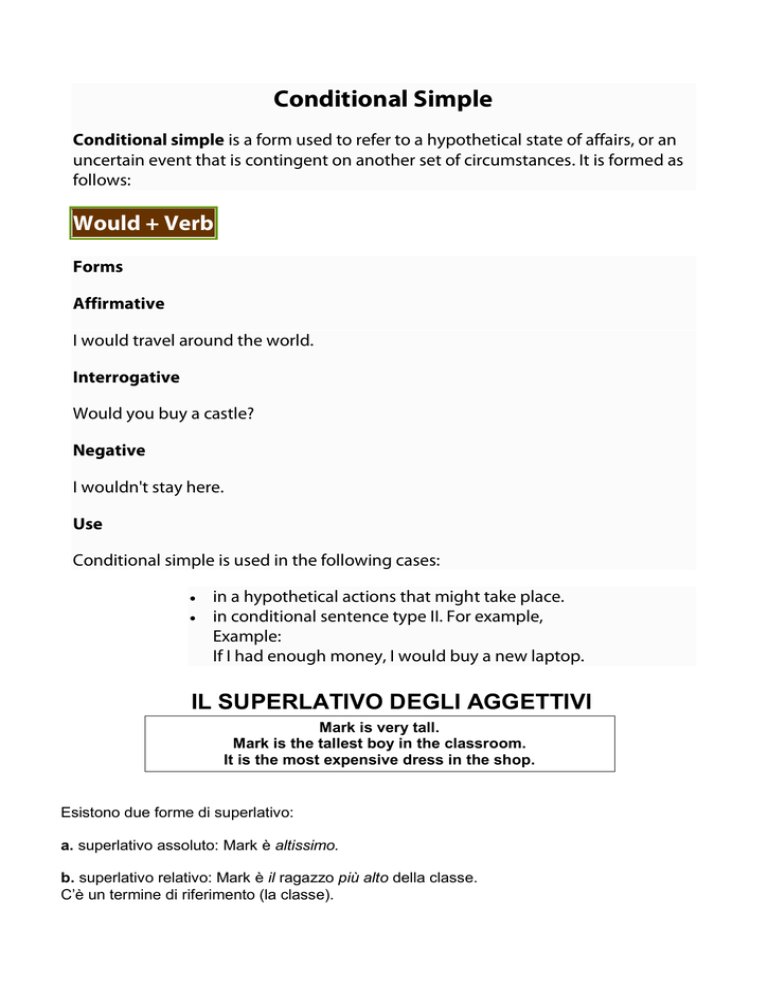
Conditional Simple
Conditional simple is a form used to refer to a hypothetical state of affairs, or an
uncertain event that is contingent on another set of circumstances. It is formed as
follows:
Would + Verb
Forms
Affirmative
I would travel around the world.
Interrogative
Would you buy a castle?
Negative
I wouldn't stay here.
Use
Conditional simple is used in the following cases:
•
•
in a hypothetical actions that might take place.
in conditional sentence type II. For example,
Example:
If I had enough money, I would buy a new laptop.
IL SUPERLATIVO DEGLI AGGETTIVI
Mark is very tall.
Mark is the tallest boy in the classroom.
It is the most expensive dress in the shop.
Esistono due forme di superlativo:
a. superlativo assoluto: Mark è altissimo.
b. superlativo relativo: Mark è il ragazzo più alto della classe.
C’è un termine di riferimento (la classe).
Il superlativo assoluto
In inglese il superlativo assoluto di un aggettivo si esprime mediante gli avverbi:
very / really / extremely + aggettivo
This book is very interesting.
Quel libro è interessantissimo / molto interessante.
Mark is really tall.
Mark è altissimo / veramente alto.
Alcuni aggettivi hanno un significato di per sé superlativo:
freezing (freddissimo)
wonderful (meraviglioso)
fantastic (fantastico)
marvelous (meraviglioso)
perfect (perfetto)
essential (essenziale)
enormous (enorme)
delicious (delizioso)
awful (orribile)
etc…
Con questi aggettivi non si usano gli avverbi very ed extremely. Si può invece utilizzare
absolutely o really (meno formale):
This cake is absolutely delicious!
Questa torta è assolutamente deliziosa!
It’s really freezing today.
Fa veramente freddissimo oggi.
Il superlativo relativo
Come si forma
Per formare il superlativo relativo degli aggettivi si applica il seguente schema.
Come si forma
Aggettivi monosillabici:
the + aggettivo + –est.
Esempio
tall >>>the tallest
(alto, il più alto)
Casi particolari:
- Gli aggettivi che terminano per –e
aggiungono solo –st.
nice >>> the nicest
(carino/simpatico, il più carino /
simpatico)
- Gli aggettivi che terminano per una
consonante preceduta da vocale
hot >>> the hottest
raddoppiano la consonante e
(caldo, il più caldo)
aggiungono -est .
- Gli aggettivi mono o bisillabici che happy >>> the happiest
terminano per –y cambiano la y in i e (felice, il più felice)
aggiungono –est.
Aggettivi con più di due sillabe*:
the + most + aggettivo
interesting >>> the most
interesting
(interessante, il più interessante)
Aggettivi irregolari
good (buono) >>> the best
bad (cattivo) >>> the worst
far (lontano) >>> the farthest /
furthest (il più lontano)
*Nota
Gli aggettivi bisillabici possono avere sia la forma in –est che essere preceduti da most:
narrow (stretto) >>> the narrowest / the most narrow.
Usi particolari dei superlativi
•
old >>> oldest / eldest
L’aggettivo old (vecchio) ha due forme superlative:
a) the oldest che si può usare sempre
That is the oldest building in the town.
Quello è l’edificio più vecchio della città.
My oldest daughter is 20 years old.
La mia figlia maggiore ha 20 anni.
b) eldest che si può utilizzare al posto di oldest quando si parla dell’età delle persone di una
famiglia.
She is my eldest daughter.
È la mia figlia maggiore.
•
Uso di most
Talvolta most seguito da aggettivo è utilizzato con il significato di very.
It is most interesting = It is very interesting
È interessantissimo / molto interessante.
Most può anche essere seguito da un sostantivo. In questo caso assume il significato di "la
maggior parte di…"
Most people: la maggior parte delle persone.
1. ESERCIZIO SUL SUPERLATIVO
Correct the wrong superlative
1) The most beautiful/the most easy/the most expensive
2) The fastest/the oldest/the most far
3) The baddest/the most popular/the prettiest
4) The most horrible/the saddest/the interestingest
5) The shortest/the most romantic/the most high
6) The best/the most boring/the convenientest
7) The most comfortable/the longest/the most cheap
8) The most efficient/the most big/the most famous
9) The most long/the most exciting/the most elegant.
10) The happiest/the tallest/the most early
2. SUL SUPERLATIVO ASSOLUTO E RELATIVO
Make correct sentences replacing the words in brackets with the
superlative form
1) Helen is (clever girl) in her class.
2) This is (good game) of the year.
3) This is (big animal) I've ever seen.
4) That is (expensive bag) in the shop.
5) This is (old church) in town.
6) King’s Road is (dangerous street) in the whole country.
7) That was (bad meal) I’ve ever had in a restaurant.
8) Who is (intelligent student) in your class?
9) Who is (popular actor) in the world?
10) What’s the name of (high mountain) in your country?
3. SUL SUPERLATIVO ASSOLUTO E RELATIVO
Make English sentences containing a superlative using the words below
1) Laura Pausini/conosciuta/cantante italiana/al mondo.
2) Questo è/buon cioccolato/io mai mangiato.
3) Questa è/discoteca vecchia/a Roma.
4) Questo è/ edificio/moderno della città.
5) Quella signora/persona simpatica/io mai incontrato.
6) Roma/grande città/d’Italia.
7) Questi sono/begli anni/della nostra vita.
8) Non ricordo/quale/lungo fiume/Scozia.
9) Il ragazzo/alto della mia classe/era fratello di Tom.
10) Maria conosce/grasso uomo/del mondo.
MODAL VERBS
I verbi modali esprimono il modo in cui il soggetto si pone nei confronti dell’azione che
compie.
I verbi modali inglesi sono:
Will
Shall
Ought
Can
May
Must
Questi verbi hanno alcune caratteristiche comuni, sintetizzate nella seguente tabella.
Caratteristiche dei verbi modali
Esempi
•
I can swim.
Tutti i verbi modali si
comportano da verbi
So nuotare (forma affermativa).
ausiliari, cioè seguono il
modello del verbo to be per
quanto riguarda la
costruzione interrogativa e
negativa, l’uso di forme
contratte e le risposte brevi. I can’t swim.
Non so nuotare (forma negativa –
Forma negativa: sono
can’t è la forma contratta di
seguiti da not.
cannot).
•
Forma interrogativa:
precedono il soggetto.
Forme contratte: come il
verbo to be, anche i verbi
modali hanno forme
contratte, utilizzate
nell’inglese parlato e
nell’inglese scritto non
formale.
Short answers: essendo
ausiliari, i verbi modali
vengono ripetuti nelle
risposte brevi.
•
In italiano sono sempre
Can you swim?
Sai nuotare? (forma interrogativa)
Yes, I can.
Si (risposta breve affermativa).
No, I can’t.
No (risposta breve negativa).
So nuotare.
seguiti da un verbo
all’Infinito, in inglese il
verbo che segue un verbo
modale va nella Forma
Base.
L’unico verbo modale ad essere
seguito dall’infinito con to è ought.
•
I verbi modali sono verbi
difettivi, cioè mancano di
alcuni tempi. Per i tempi di
cui mancano si utilizzano
forme sostitutive.
Per le forme sostitutive, vedi i
capitoli relativi ai singoli verbi.
•
Nuotare è un Infinito.
I can swim.
Swim: Forma Base.
Dovrei partire domani.
I ought to leave tomorrow.
To leave: Infinito.
I must get up very early in the
morning.
Mi devo alzare molto presto al
mattino.
I had to get up very early
yesterday morning.
Mi sono dovuto alzare molto presto
ieri mattina.
Alla terza persona singolare He can swim.
del Simple Present non
Egli sa nuotare.
prendono la s.
Will
Forma contratta:‘ll
Forma negativa: will not >>> won’t
•
Il verbo modale will è utilizzato come ausiliare del Futuro (vedi capitolo relativo al
Futuro).
•
Nelle domande in seconda persona singolare e plurale è utilizzato con il significato
di volere, quando si chiede gentilmente a qualcuno di fare qualche cosa.
Will you open the window, please?
Vuoi aprire la finestra, per favore?
•
Il suo Simple Past would è utilizzato come ausiliare del Condizionale (vedi capitolo
relativo al Condizionale).
Forma contratta: ‘d
Forma negativa: would not >>> wouldn’t
Would è utilizzato anche per esprimere un’abitudine nel passato.
My grandmother would always make apple pies for us.
La mia nonna faceva sempre torte di mele per noi.
Nota
Esiste anche un verbo non modale to will. È un verbo regolare
(will – willed – willed), prende normalmente la -s alla terza persona singolare del Simple
Present. Significa volere fortemente, essere fermamente deciso a… e, come secondo
significato, lasciare in testamento.
They willed themselves to survive.
Erano fermamente decisi a sopravvivere.
He willed all his money to Deborah.
Ha lasciato in testamento tutto il suo denaro a Deborah.
Shall
Forma contratta: ‘ll
Forma negativa: shall not >>> shan’t
•
Il suo uso come ausiliare del Futuro alla prima persona singolare e plurale sta
progressivamente scomparendo nell’inglese moderno, essendo sostituito da will
(vedi capitolo relativo al Futuro).
•
Nelle domande in prima persona singolare e plurale assume il significato di dovere
quando ci si offre di fare qualche cosa o si propone di fare qualche cosa.
Shall I help you?
Devo aiutarti?
Shall we go to the pub, tonight?
Dobbiamo andare al pub questa sera?
•
Il suo Simple Past should è utilizzato con il significato di condizionale del verbo
dovere (vedi capitolo relativo al Condizionale - Condizionale dei verbi modali).
Forma contratta: ‘d
Forma negativa: should not >>> shouldn’t
You shouldn’t drive so fast!
Non dovresti guidare così veloce!
Ought
È l’unico verbo modale ad essere seguito dall’infinito con to.
Forma negativa: ought not >>> oughtn’t
È utilizzato con lo stesso significato di should (Condizionale del verbo dovere) nelle frasi
affermative. L’uso di ought nelle frasi interrogative è molto raro.
Nelle frasi negative è usato solo in un contesto formale ed è seguito dalla Forma Base
(infinito senza to).
You ought to be more careful.
Dovresti stare più attento.
You ought not work till midnight every night.
Non dovresti lavorare fino a mezzanotte tutte le sere.
Per l’uso di can, may e must, vedi i relativi capitoli.
Esistono anche due verbi semi – modali:
Need
Dare
Questi verbi hanno alcuni comportamenti tipici dei verbi modali ed altri tipici dei verbi non
modali. Per l’uso di need e dare vedi i relativi capitoli.
Choose the right modal verb
1. There is plenty of tomatoes in the fridge. You
2. It's a hospital. You
buy any.
smoke.
3. He had been working for more than 11 hours. He
He
be tired after such hard work.
prefer to get some rest.
4. I
speak Arabic fluently when I was a child and we lived in Morocco. But after we
moved back to Canada, I had very little exposure to the language and forgot almost everything I
knew as a child. Now, I
5. The teacher said we
just say a few things in the language.
read this book for our own pleasure as it is optional. But we
read it if we don't want to.
6.
you stand on your head for more than a minute? No, I
7. If you want to learn to speak English fluently, you
8. Take an umbrella. It
9. You
by children.
10. People
11. Drivers
12.
13. You
14.
.
to work hard.
rain later.
leave small objects lying around . Such objects
walk on grass.
stop when the traffic lights are red.
I ask a question? Yes, of course.
take your umbrella. It is not raining.
you speak Italian? No, I
.
be swallowed
EUROPEAN UNION
The European Union (EU) is an
economic and political union of 28 member states that are located primarily in
Europe. The EU operates through a system of supranational independent
institutions and intergovernmental negotiated decisions by the member states
Institutions of the EU include the European Commission, the Council of the
European Union, the European Council, the Court of Justice of the European
Union, the European Central Bank, the Court of Auditors, and the European
Parliament. The European Parliament is elected every five years by EU citizens.
The EU's de facto capital is Brussels. The EU traces its origins from the European
Coal and Steel Community (ECSC) and the European Economic Community
(EEC), formed by the Inner Six countries in 1951 and 1958, respectively. In the
intervening years the community and its successors have grown in size by the
accession of new member states and in power by the addition of policy areas to its
remit. The Maastricht Treaty established the European Union under its current
name in 1993. The latest major amendment to the constitutional basis of the EU,
the Treaty of Lisbon, came into force in 2009. The EU has developed a single
market through a standardised system of laws that apply in all member states.
Within the Schengen Area (which includes 22 EU and 4 non-EU states) passport
controls have been abolished EU policies aim to ensure the free movement of
people, goods, services, and capital, enact legislation in justice and home affairs,
and maintain common policies on trade, agriculture, fisheries, and regional
development The eurozone, a monetary union, was established in 1999 and came
into full force in 2002. It is currently composed of 17 member states. Through the
Common Foreign and Security Policy the EU has developed a role in external
relations and defence. Permanent diplomatic missions have been established
around the world. The EU is represented at the United Nations, the WTO, the G8,
and the G-20. With a combined population of over 500 million inhabitants, or 7.3%
of the world population, the EU in 2012 generated a nominal gross domestic
product (GDP) of 16.584 trillion US dollars, constituting approximately 23% of
global nominal GDP and 20% when measured in terms of purchasing power parity,
which is the largest nominal GDP and GDP PPP in the world. The EU was the
recipient of the 2012 Nobel Peace Prize.
GRADED EXAMINATIONS IN SPOKEN ENGLISH
LEVEL: ELEMENTARY 1
QUADRO EUROPEO DELLE LINGUE: LIVELLO A1-A2 GRADE 2/3
1. What do you like doing at weekends?
I like going out with my friends, playing football etc…
2. Do you like swimming/skating/skiing/playing football-volleyball etc? Yes, I do. I
love…….. No, I don’t. I hate……………..
3. Do you enjoy listening to music?
Yes, I do -No, I don’t
4. When is your birthday?
It’s the……………th of……..
5. What’s the date today? What day is it on? It’s the ……… of.
6. What day was it yesterday?
It was……………………..
7. What day do you usually go shopping?
I usually go on…………..
8. What’s the first day of the week?
It’s Monday
9. Where is the ………..?
It’s behind/in front of/between/next to/under/on…………..
10. Is this your……?
Yes, it’s my…….
11. How many uncles have you got?
I have got……..uncles.
12. How many sisters/brothers have you got? I have
got…sisters/brothers.
I haven’t any sisters/brothers.
13. How many people are there in the picture?
There are………..people.
14. Where are they?
They are at school/at home.
15. How are you wearing?
I am wearing a …T-shirt,…..trousers/skirt,
……shoes.
16. How many boys are there in your class?
There are…….boys.
17. Who’s your best friend?
My best friend is……………..
18. How many people are there in your family?
There are……..people.
19. Tell me about your family?
My family is made up by me, my mother, my father….
20. Are you a student?
Yes, I am - No, I am not
21. What are your hobbies?
My hobbies are football/swimming/skating/…………….
22. What do you usually do in the evenings?
I watch Tv, I study.
23. What’s the weather like today?
It’s sunny/cloudy It’s hot/cold. It’s raining.
24. What’s the weather normally like in May?.
It’s sunny, this year it’s cloudy.
25. Where did you go on holiday?
I went in……………………
26. How was your holiday?
It was funny/boring.
27. what was the weather like yesterday?
28. Where did you go yesterday?
It was sunny/cloudy/hot/cold.
I went to ………..with my friends.
29. Who do you usually sit next to in class?
I sit next…………
30. Who do you usually behind/in front of you? I sit in front of/behind…………….
31. What’s the name of the street in front of the school? it’s……….street
32. Has the school got a computer room?
Yes, there is. It’s near my class.
33. Is there a supermarket near the school?
Yes, there is. No there isn’t.
34. What will the weather be like tomorrow? I think it will be sunny/cloudy/it will rain
35. Do you think it will be sunny this weekend? Yes I think. No, I think it will be rainy.
36. Will it be hot in August?
Yes, it will. No, it won’t.
37. Will you go to university?
Yes, I will. I will attend……… No, I won’t.
38. Will you get a good mark in your English exam?
I hope so.
39. Do you like travelling?
No, I don’t. Yes, I hope I will visit many countries.
40. What city is bigger, New York or Rome? I think New York is bigger than Rome
41. What city is older, London or Rome?
Rome is older than London.
42. What city is smaller, London or Rome?
Rome is smaller than London.
43. What city is hotter/drier, London or Rome?
Rome is hotter/drier than London
44. What city is colder/wetter, London or Rome?
London is colder/wetter than Rome
45. What city is more expensive London or New ? London is more expensive than New York
46. Which is the oldest city, Rome or New York? Rome is the oldest city.
47. Which is the youngest city, Moscow or New York. New York is the youngest city.
48. Which is the best department store?
It’s …………….. in………….
49. Where is the nearest chemist’s?
It’s in my village, near the church.
50. If it rains tomorrow…….. I will watch Tv.
51. If I pass my exam, I will study English forever.
52. What will you do if it’s sunny this weekend?
I will ride/go out with my friends.
53. What will happen if you don’t do your homework? My teacher will be angry with me.
54. What will your mum give you if you tidy your bedroom? She will tell me it’s a miracle.
55. Which film will you see tonight?
I will see……
56. What will happen if you don’t study hard. My school results will be bad.
57. What secondary school will you attend? I will attend…………………….
58. Will you continue to study English? Yes, I want to improve my English
59. When were you born?
I was born in……..the …………th of…… (ninenteen ninety- )
89. What do you go to school by?
I go to school by…….. (car, bus) on foot
Prof. Massimiliano Badiali Copyright 2001-2008 all right reserved
EXAMINATIONS IN SPOKEN ENGLISH
2
Tag Questions
Definition
A tag question is a grammatical structure. It refers to a declarative statement or an imperative that are
modified to become a question by adding an interrogative fragment.
Use
Tag questions:
•
•
•
•
can be considered as an indicator of politeness, emphasis, or irony;
they may suggest confidence or lack of confidence;
they may be confrontational or tentative;
in legal settings, tag questions can be found in leading question.
Form
Tag questions vary according to different factors such as the choice of auxiliary, the negation.
The structure is generally as follows:
Affirmative statement
he likes him
Negative statement
Negative Tag
doesn't he?
Affirmative Tag
she doesn't care about him does she?
Examples
Statements
Affirmative statement
Negative tag
He is excellent at languages,
isn't he?
You were late,
weren't you?
They are working on a new project,
aren't they?
She writes good poems,
doesn't she?
We have worked hard to earn this money, haven't we?
He called her,
didn't he?
You should see a doctor,
shouldn't you?
He can drive,
can't he?
You will help us,
won't you?
Negative statement
Affirmative tag
He isn't an athlete,
is he?
They weren't early,
were they?
You aren't writing a new book, are you?
She doesn't work in a hospital, does she?
He hasn't found the solution,
has he?
You didn't visit the museum,
did you?
We shouldn't sleep late,
should we?
You won't tell her,
will you?
Imperatives
Imperative
Tag
keep quiet, won't you ?
will you?
would you?
could you?
Choose the correct word.
1. They're working on the project,
2. It wasn't my fault,
?
?
3. Bill got what he wanted,
?
4. It won't be hard to convince her,
?
5. We can't leave him alone,
6. We've done our job,
?
?
7. You should apologize for what you have done,
?
8. They didn't start the meeting at two o'clock, <
9. They finish work at five o'clock,
10. She doesn't like him,
?
?
?
THE PRESENT PERFECT
I have seen that film
Quando si usa
Il Present Perfect è il tempo verbale inglese che esprime il concetto generale di
un’azione che, pur essendosi svolta nel passato, ha ancora qualche tipo di
rapporto con il presente.
Tale rapporto con il presente può riguardare:
•
•
Il tempo in cui l’azione si è svolta.
L’azione stessa, che non è finita mentre si parla.
In pratica, si deve usare il Present Perfect quando si verifica almeno una delle
seguenti condizioni.
1. L’azione si è svolta nel passato, ma il tempo non è espresso (non dico
quando).
Esempio:
Ho visto quel film. L’azione di vedere il film è passata, ma non
dico quando l’ho visto, perciò uso il Present
Perfect.
I have seen that film.
2. L’azione è passata, il tempo è espresso, ma non è finito mentre si parla.
Esempio:
Ho visto quel film L’azione di vedere il film è passata e
questa settimana. finita, il tempo è espresso, questa
settimana, ma la settimana non è
ancora finita. Uso il Present Perfect.
I have seen that film this week.
3. In una frase al passato è presente uno dei seguenti avverbi di tempo:
In
inglese
In italiano
Already già
(usato in frasi
affermative e
interrogative)
Just
appena
Esempio
I have already met him.
(L'ho già conosciuto.)
Have you already met him?
(Lo hai già conosciuto?)
I have just met him.
(L'ho appena conosciuto.)
Ever
mai
Have you ever met him?
(Lo hai mai conosciuto?)
(usato in frasi
interrogative)
Never
mai
I have never met him.
(Non l'ho mai conosciuto.)
(vuole sempre il
verbo nella forma
affermativa)
Recently recentemente
I have met him recently.
(L'ho conosciuto recentemente.)
Lately
Yet
a) ancora (in frasi
negative)
a) I haven't met him yet.
(Non l'ho ancora conosciuto.)
b) Have you met him yet?
(Lo hai già conosciuto?)
b) già (in frasi
interrogative)
Nota:
Already, just, ever, never si collocano tra l'ausiliare have/has e il verbo.
Esempio:
Ho appena finito.
I have just finished.
Non l'ho mai visto.
I have never seen him.
Yet, recently, lately si mettono alla fine della frase.
Esempio:
Non ho ancora finito.
I haven’t finished yet.
4. L’azione è iniziata nel passato ma non è ancora finita nel momento in cui
si parla.
Sono frasi in cui in italiano si usa il presente indicativo ed un'espressione di
tempo introdotta dalla preposizione da:
Esempio:
- Vivo in Italia da quattro anni.
- Lo conosco dal 1985
- Da quanto tempo lo conosci?
In inglese il verbo viene messo al Present Perfect, mentre l'espressione di tempo
è introdotta da:
SINCE quando è espresso il momento di inizio dell’azione: "da quando?"
Esempio:
Lo conosco dal 1995.
I have known him since 1995.
Il momento di inizio dell’azione può anche essere espresso da un’intera
proposizione temporale.
Esempio:
Lo conosco da quando ero bambino.
I have known him since I was a child.
FOR quando è espressa la durata dell’azione: "da quanto tempo?"
Esempio:
Lo conosco da tre anni.
I have known him for three years.
Nelle domande l’espressione "da quanto tempo / da quando…?" si esprime in
inglese con HOW LONG?
Esempio:
Da quanto tempo lo conosci?
How long have you known him?
Nota
Queste frasi sono ingannevoli anche quando si trovano in inglese:
"I have been married for five years".
La maggior parte degli italiani capirebbe che sono stata sposata per cinque anni
(adesso non lo sono più). Invece la frase significa:
"Sono sposata da cinque anni" (sono ancora sposata).
Come si costruisce
Il Present Perfect è un tempo composto che utilizza l’ausiliare TO HAVE al
Simple Present ed il Participio Passato (3° voce del paradigma) del verbo della
frase.
Essendo un tempo composto, è l’ausiliare have a prendere la forma interrogativa
e negativa, il verbo rimane al suo posto al participio passato.
Forma
Costruzione
Forma
affermativa
SOGGETTO +
HAVE/HAS +
PARTICIPIO
PASSATO
Esempio
See-saw-seen (vedere)
I have seen
you have seen
he/she/it has seen
we have seen
you have seen
they have seen
Forma
negativa
I have not seen
SOGGETTO +
HAVE/HAS + NOT
+ PART. PASS. you have not seen
HAVE NOT >>>
HAVEN'T
he/she/it has not seen
etc…
HAS NOT >>>
HASN'T
Forma
interrogativa
HAVE/HAS +
SOGGETTO +
PART. PASS.
Have I seen…?
Have you seen…?
Has he/she/it seen…?
EXERCISE 1: Write positive sentences in present perfect simple
1. Bob / visit / his grandma
2. Jimmy / play / on the computer
3. Sue and Walter / wash / their car
4. Andrew / repair / his bike
5. Phil / help / Anne with maths
6. Brad and Louise / watch / a film
7. Tamara / talk to / her best friend
8. Bridgette / draw / a picture
9. Carol / read / a computer magazine
10. Tom and Alice / be / to a restaurant
EXERCISE 2: Write negative sentences in present perfect simple.
1. Sarah / not / wash the dishes
2. Anita / not / clean the kitchen
3. Maureen and Gavin / not / water the plants
4. Joey / not / make his bed
5. David / not / buy milk
6. Lisa / not / be to the baker's
7. Aran and Jack / not / do their homework
8. Jane and Ben / not / tidy up their rooms
9. Alex / not / feed the hamster
10. Hazel / not / empty the bin
EXERCISE 3: Write questions in present perfect simple.
1. you / answer / the question
2. Jenny / lock / the door
3. Walter / call / us
4. you / see / the picture
5. your parents / get / the letter
6. it / rain / a lot
7. how often / we / sing / the song
8. Maureen / watch / the film
9. how many books / Bob / read
10. ever / you / be / to London
EXERCISE 4: Decide if you use simple past/present perfect simple
Correct the sentences (each sentence has a mistake)
1) Ten years ago Ted has asked Rosie to marry him.
2) Mr. Brown broughted me some work to do yesterday.
3) We’ve gone swimming last week.The sea was calm.
4) When I were at college, lessons began at 8 o’clock.
5) Did you ever been to Rome?
6) They never saw a tiger before.
7) I worked for Mr. Cooper since I left school.
8) I lived here for six years.
9) She has met Tom three days ago.
10) Have he arrived yet?
THE
ROYAL
BABY………………………………………………
London (CNN) -- With fanfare fit for a prince, Catherine, Duchess of Cambridge, and
husband Prince William welcomed their first child Monday. The baby boy was born at
4:24 p.m., weighing 8 pounds, 6 ounces. A name has not yet been announced for
the child, who is third in line to the throne. "Her Royal Highness and her child are
both doing well," read an official bulletin placed outside Buckingham Palace, where
crowds erupted in cheers. People from all over the world had gathered outside
Buckingham Palace to await news of the birth. At least one group of well-wishers
brought flowers, champagne and a card for the Duke and Duchess of Cambridge.
The fountains at Trafalgar Square were turned blue.
"I'm sure that right across the country and indeed right across the commonwealth,
people will be celebrating and wishing the royal couple well," said British Prime
Minister David Cameron. "It is an important moment in the life of our nation, but I
suppose above all, it's a wonderful moment for a warm and loving couple who got a
brand new baby boy," he said. The new parents spent some time with their baby
before calling family members -- starting with Queen Elizabeth II -- to announce the
birth, a Kensington Palace source told CNN royal correspondent Max Foster. Prince
William remained at Catherine's side throughout the labor and the baby was born
vaginally, not via a C-section, the source said. "We could not be happier," said
Prince William, according to the Kensington Palace source. The royal couple
remained in hospital overnight but hopes were high that they'd make an appearance
as early as Tuesday. A multigun salute is set to happen that day to mark the birth.
"Both my wife and I are overjoyed at the arrival of my first grandchild. It is an
incredibly special moment for William and Catherine, and we are so thrilled for them
on the birth of their baby boy," Prince Charles and wife Camilla said in a statement.
Earlier Monday, the duchess and Prince William traveled by car from Kensington
Palace to the Lindo Wing at St. Mary's Hospital. The hospital, next to Paddington
Station in London, is where William and his brother Prince Harry were born.
History of Hydraulics
Hydraulics is a topic in applied science and engineering dealing with the mechanical
properties of liquids. At a very basic level hydraulics is the liquid version of pneumatics.
Fluid mechanics provides the theoretical foundation for hydraulics, which focuses on the
engineering uses of fluid properties. In fluid power, hydraulics is used for the generation,
control, and transmission of power by the use of pressurized liquids. Hydraulic topics
range through some part of science and most of engineering modules, and cover concepts
such as pipe flow, dam design, fluidics and fluid control circuitry, pumps, turbines,
hydropower, computational fluid dynamics, flow measurement, river channel behavior and
erosion.
Free surface hydraulics is the branch of hydraulics dealing with free surface flow, such as
occurring in rivers, canals, lakes, estuaries and seas. Its sub-field open channel flow
studies the flow in open channels.
The word "hydraulics" originates from the Greek word ὑδραυλικός (hydraulikos) which in
turn originates from ὕδωρ (hydor, Greek for water) and αὐλός (aulos, meaning pipe).
Contents
Ancient and medieval eral
Early uses of water power date back to Mesopotamia and ancient Egypt, where irrigation
has been used since the 6th millennium BC and water clocks had been used since the
early 2nd millennium BC. Other early examples of water power include the Qanat system
in ancient Persia and the Turpan water system in ancient China.
Greek / Hellenistic age
The Greeks constructed sophisticated water and hydraulic power systems. An example is
the construction by Eupalinos, under a public contract, of a watering channel for Samos,
the Tunnel of Eupalinos. An early example of the usage of hydraulic wheel, probably the
earliest in Europe, is the Perachora wheel (3rd century BC).[2]
Notable is the construction of the first hydraulic automata by Ctesibius (flourished c. 270
BC) and Hero of Alexandria (c. 10 – 80 AD). Hero describes a number of working
machines using hydraulic power, such as the force pump, which is known from many
Roman sites as having been used for raising water and in fire engines.
China
In ancient China there was Sunshu Ao (6th century BC), Ximen Bao (5th century BC), Du
Shi (circa 31 AD), Zhang Heng (78 - 139 AD), and Ma Jun (200 - 265 AD), while medieval
China had Su Song (1020 - 1101 AD) and Shen Kuo (1031–1095). Du Shi employed a
waterwheel to power the bellows of a blast furnace producing cast iron. Zhang Heng was
the first to employ hydraulics to provide motive power in rotating an armillary sphere for
astronomical observation.
Sri Lanka
Moat and gardens at Sigirya.In ancient Sri Lanka, hydraulics were
widely used in the ancient kingdoms of Anuradhapura and Polonnaruwa.[3] The discovery
of the principle of the valve tower, or valve pit, for regulating the escape of water is
credited to ingenuity more than 2,000 years ago.[4] By the first century AD, several largescale irrigation works had been completed.[5] Macro- and micro-hydraulics to provide for
domestic horticultural and agricultural needs, surface drainage and erosion control,
ornamental and recreational water courses and retaining structures and also cooling
systems were in place in Sigiriya, Sri Lanka. The coral on the massive rock at the site
includes cisterns for collecting water.
Innovations in Ancient Rome
Aqueduct of Segovia, a 1st-century AD masterpiece. In Ancient Rome many different
hydraulic applications were developed, including public water supplies, innumerable
aqueducts, power using watermills and hydraulic mining. They were among the first to
make use of the siphon to carry water across valleys, and used hushing on a large scale to
prospect for and then extract metal ores. They used lead widely in plumbing systems for
domestic and public supply, such as feeding thermae. Hydraulic mining was used in the
gold-fields of northern Spain, which was conquered by Augustus in 25 BC. The alluvial
gold-mine of Las Medulas was one of the largest of their mines. It was worked by at least 7
long aqueducts, and the water streams were used to erode the soft deposits, and then
wash the tailings for the valuable gold content.
Modern era (c. 1600 – 1870)
Benedetto Castelli
In 1619 Benedetto Castelli (1576 - 1578–1643), a student of Galileo Galilei, published the
book Della Misura dell'Acque Correnti or "On the Measurement of Running Waters", one of
the foundations of modern hydrodynamics. He served as a chief consultant to the Pope on
hydraulic projects, i.e., management of rivers in the Papal States, beginning in 1626.[6]
Blaise Pascal
Blaise Pascal (1623–1662) studied fluid hydrodynamics and hydrostatics, centered on the
principles of hydraulic fluids. His inventions include the hydraulic press, which multiplied a
smaller force acting on a smaller area into the application of a larger force totaled over a
larger area, transmitted through the same pressure (or same change of pressure) at both
locations. Pascal's law or principle states that for an incompressible fluid at rest, the
difference in pressure is proportional to the difference in height and this difference remains
the same whether or not the overall pressure of the fluid is changed by applying an
external force. This implies that by increasing the pressure at any point in a confined fluid,
there is an equal increase at every other point in the container, i.e., any change in
pressure applied at any point of the fluid is transmitted undiminished throughout the fluids.
Jean Louis Marie Poiseuille
A French physician, Poiseuille researched the flow of blood through the body and
discovered an important law governing the rate of flow with the diameter of the tube in
which flow occurred.[citation needed]
In the UK
Several cities developed city-wide hydraulic power networks in the 19th century, to operate
machinery such as lifts, cranes, capstans and the like. Joseph Bramah[7] was an early
innovator and William Armstrong[8] perfected the apparatus for power delivery on an
industrial scale. In London, the London Hydraulic Power Company[9] was a major supplier
its pipes serving large parts of the West End of London, City and the Docks, but there
were schemes restricted to single enterprises such as docks and railway goods yards.
PRINCESS DIANA
- BIOGRAPHY
Princess Diana was an iconic figure of the late 20th Century. During her life she was often said
to be the most photographed person, appearing on the cover of People magazine more than
anyone else. She epitomised feminine beauty and glamour. At the same time, she was admired
for her groundbreaking charity work; in particular her work with AIDS patient,s and
supporting the campaign for banning landmines. Married to Prince Charles in 1981, she
received the title of “Her Royal Highness Princess Diana of Wales” She is the Mother of Prince
William and Prince Harry 2nd and 3rd in line to the throne respectively. Diana was born to an
aristocratic family who links to the Royal Family. In 1981, Diana married Prince Charles. Diana
was 13 years the junior, at an age of just 20, Charles by contrast was 33 at the time of the
wedding. During their marriage they had two sons, Prince William and Prince Harry. However,
in the mid 1980s, strains started to appear in the marriage, and under much publicity the
marriage broke up leading to a divorce in 1992. During this period Diana is said to have
suffered various health problems such as bulimia and depression. As Princess of Wales, Diana
was expected to take part in various official engagements, such as, opening of hospitals. This
provided a natural outlet for her to become involved in various types of charitable work. Her
natural sympathy and oneness with patients was much admired. In 1987, Princess Diana was
one of the first well known celebrities to be photographed with a victim of AIDS. This was
important in changing attitudes to the disease. At the time, many thought the disease could be
contacted by touch alone. Another of her high profile charities, was her involvement in the
campaign to ban landmines. In January 1997, she visited mine fields in Angola to inspect the
clearing of landmines. After her death, the Ottawa treaty, was signed banning the use of antipersonnel landmines. Many agree that her support and role in the campaign played an
important role in influencing this decision. Shortly before her death, June 18th Princess Diana
met with Mother Teresa. Both admired each other. Mother Teresa always said “Diana is my
daughter.” With utmost humility Diana said “I am a very, very small Mother Teresa. Diana
died on 31st August, 1997, in a car crash involving Dodi Al-Fayed. (see last moments of
Princess Diana) It was said they were being chased by paparazzi at the time the fatal accident.
Although, the inquest noted that the driver was also under the influence of drugs and drink.
Controversy still surrounds her death, with a further inquest still underway. The death of
Diana had a profound impact on the British public and those in other countries. It led to an
unprecedented outpouring of grief and sympathy, for a person people had taken into their
hearts. Over 1 million bouquets of flowers were laid at Buckingham Palace. Her funeral was
watched by countless millions around the world. Her final resting place was her family home of
Althorp.
Prof. Massimiliano Badiali
Candle in the Wind
1997-ELTON JOHN
"Goodbye England's Rose" is a remake of "Candle in the Wind" by Elton John that was
released as a tribute single to Diana, Princess of Wales. The 1997 version of "Candle in the
Wind" is based on the 1973 version of "Candle in the Wind," released by Elton John. The
lyrics of that earlier version, written by Bernie Taupin, were a tribute to Marilyn Monroe.
The opening lines of the 1973 version, "Goodbye Norma Jean, though I never knew you at
all," were adapted to "Goodbye England's rose, may you ever grow in our hearts." In fact,
most of the lyrics were adapted to suit the circumstances of Diana's life and death.
Goodbye England's _____
May you ever grow in our hearts
You were the grace that placed itself
Where lives were torn apart
You called out to our _____
And you whispered to those in pain
Now you belong to heaven
And the stars spell out your _____
And it seems to me you lived your life
Like a candle in the wind
Never fading with the sunset
When the rain set in
And your footsteps will always fall
here
Along England's greenest hills
Your candle's burned our long _____
Your legend ever will
And it seems to me you lived your life
Like a candle in the _____
Never fading with the sunset
When the ____ set in
And your footsteps will always fall
here
Along England's greenest ____
Your candle's burned out long before
Your ____ ever will
Goodbye England's rose
May you ever grow in our _____
You were the grace that placed itself
Where lives were torn apart
Goodbye England's rose
From a country lost without your soul
Who'll miss the _____ of your
compassion
More than you'll ever know
Loveliness we've lost
These empty days without your smile
This torch we'll always carry
For our ______'s golden child
And even though we try
The truth brings us to tears
All our words cannot express
The joy you brought us through the
________
And it seems to me you ____ your
life
Like a candle in the wind
Never fading with the sunset
When the rain set in
And you footsteps will always fall
here
Along England's greenest hills
Your candle's burned out long before
Your legend ever will
USA for Africa - We Are The World (w/M.Jackson)
We're The World (USA For Africa)"
There comes a time when we heed a certain ______
When the world must come together as one
There are people ______
And it's time to lend a hand to life
The greatest gift of all
We can't go on pretending day by _____
That someone, somewhere will soon make a change
We all are a part of God's great big family
And the truth, you know,
Love is all we need
[Chorus:]
We are the world, we are the ___________
We are the ones who make a brighter day
So let's start giving
There's a choice we're making
We're saving our own lives
It's true we'll make a better day
Just you and ________
Send them your heart so they'll know that someone cares
And their lives will be stronger and ________
As God has shown us by turning stone to bread
So we all must lend a helping hand
[Chorus]
When you're down and out, there seems no hope at all
But if you just believe there's no way we can _____
Well...well...well
Let's realize that a change can only come
When we stand together as one
[Chorus]

